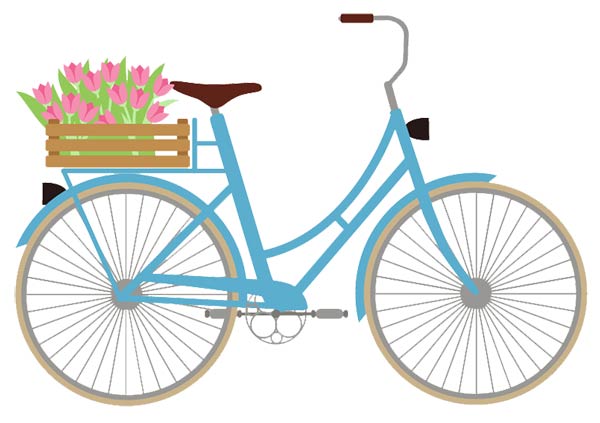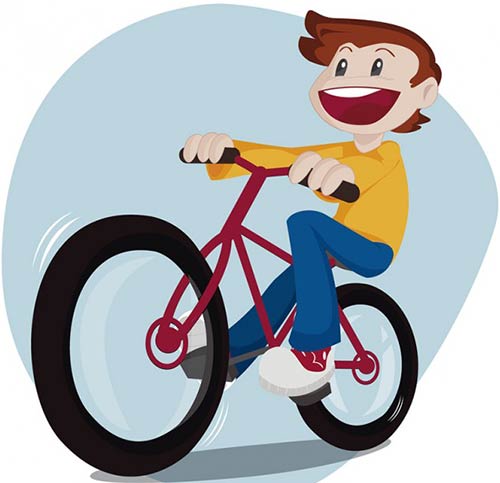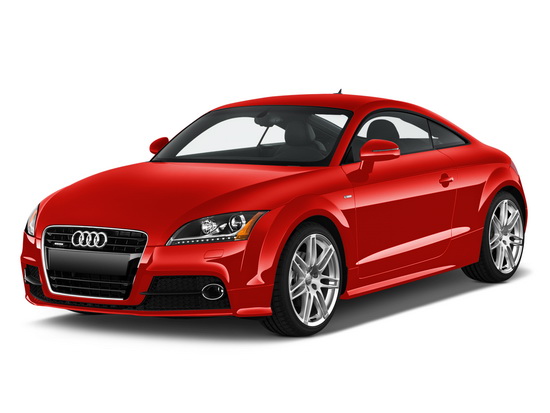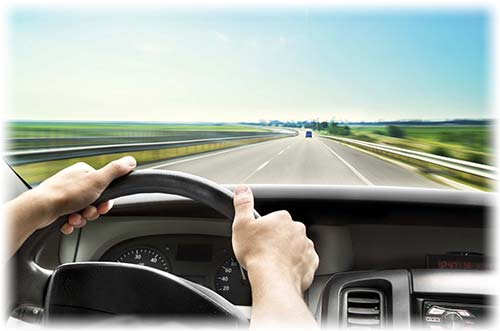drive
drive [drive drives drove driving driven] verb, noun [draɪv] [draɪv]
verb (drove [drəʊv] ; [droʊv] , driven [ˈdrɪvn] ; [ˈdrɪvn] )
VEHICLE
1. intransitive, transitive to operate a vehicle so that it goes in a particular direction
• Can you drive?
• Don't drive so fast!
• I drove to work this morning.
• Shall we drive (= go there by car) or go by train?
• ~ sth He drives a taxi (= that is his job).
2. transitive ~ sb (+ adv./prep.) to take sb somewhere in a car, taxi, etc
• Could you drive me home?
3. transitive ~ sth to own or use a particular type of vehicle
• What car do you drive?
MACHINE
4. transitive, usually passive ~ sth to provide the power that makes a machine work
• a steam-driven locomotive
MAKE SB DO STH
5. transitive ~ sb (+ adv./prep.) to force sb to act in a particular way
• The urge to survive drove them on.
• You're driving yourself too hard.
6. transitive to make sb very angry, crazy, etc. or to make them do sth extreme
• ~ sb + adj. to drive sb crazy/mad/insane
• ~ sb to do sth Hunger drove her to steal.
• ~ sb to sth Those kids are driving me to despair.
• (humorous) It's enough to drive you to drink (= to make you start drinking too much alcohol).
MAKE SB/STH MOVE
7. transitive ~ sb/sth + adv./prep. to force sb/sth to move in a particular direction
• to drive sheep into a field
• The enemy was driven back.
CAUSE STH TO MAKE PROGRESS
8. transitive ~ sth to influence sth or cause it to make progress
• This is the main factor driving investment in the area.
HIT/PUSH
9. transitive ~ sth + adv./prep. to force sth to go in a particular direction or into a particular position by pushing it, hitting it, etc
• to drive a nail into a piece of wood
MAKE A HOLE
10. transitive ~ sth + adv./prep. to make an opening in or through sth by using force
• They drove a tunnel through the solid rock.
IN SPORT
11. transitive, intransitive ~ (sth) (+ adv./prep.) to hit a ball with force, sending it forward
• to drive the ball into the rough (= in golf )
WIND/WATER
12. transitive ~ sth (+ adv./prep.) to carry sth along
• Huge waves drove the yacht onto the rocks.
13. intransitive (+ adv./prep.) to fall or move rapidly and with great force
• The waves drove against the shore.
more at run/drive/work yourself into the ground at ground n., drive/strike a hard bargain at hard adj., needs must (when the devil drives) at need n., as clean, pure, etc. as the driven snow at snow
Word Origin:
Old English drīfan ‘urge (a person or animal) to go forward’, of Germanic origin; related to Dutch drijven and German treiben.
Thesaurus:
drive verb
1. I, T
• I learned to drive at 17.
steer • • handle • |BrE manoeuvre • |AmE maneuver •
drive/steer/handle/manoeuvre a car
2. I, T
• We've driven over 200 miles today.
travel • • go • • come • • do •
drive/travel/go/come from/to sth
drive/travel/go/come/do 50 miles/10 kilometres, etc.
drive/travel/come a long distance
3. T (sometimes disapproving)
• You're driving yourself too hard.
work • |disapproving overwork • |usually approving push •
drive/work/push sb hard
drive/push sb too far/to the limit
drive/work sb into the ground
Collocations:
Driving
Having a car
have/own/ (BrE) run a car
ride a motorcycle/motorbike
drive/prefer/use an automatic/a manual/(NAmE, informal) a stick shift
have/get your car serviced/fixed/repaired
buy/sell a used car/(especially BrE) a second-hand car
take/pass/fail a (BrE) driving test/(both NAmE) driver's test/road test
get/obtain/have/lose/carry a/your (BrE) driving licence/(NAmE) driver's license
Driving
put on/fasten/ (NAmE) buckle/wear/undo your seat belt/safety belt
put/turn/leave the key in the ignition
start the car/engine
(BrE) change/ (NAmE) shift/put sth into gear
press/put your foot on the brake pedal/clutch/accelerator
release the clutch/(especially BrE) the handbrake/(both NAmE) the emergency brake/the parking brake
drive/park/reverse the car
(BrE) indicate left/right
(especially NAmE) signal that you are turning left/right
take/miss (BrE) the turning/(especially NAmE) the turn
apply/hit/slam on the brake(s)
beep/honk/ (especially BrE) toot/ (BrE) sound your horn
Problems and accidents
a car skids/crashes (into sth)/collides (with sth)
swerve to avoid an oncoming car/a pedestrian
crash/lose control of the car
have/be in/be killed in/survive a car crash/a car accident/(NAmE) a car wreck/a hit-and-run
be run over/knocked down by a car/bus/truck
dent/hit (BrE) the bonnet/(NAmE) the hood
break/crack/shatter (BrE) the windscreen/(NAmE) the windshield
blow/ (especially BrE) burst/puncture (BrE) a tyre/(NAmE) a tire
get/have (BrE) a flat tyre/a flat tire/a puncture
inflate/change/fit/replace/check a tyre/tire
Traffic and driving regulations
be caught in/get stuck in/sit in a traffic jam
cause congestion/tailbacks/traffic jams/gridlock
experience/face lengthy delays
beat/avoid the traffic/the rush hour
break/observe/ (NAmE) drive the speed limit
be caught on (BrE) a speed camera
stop sb for/pull sb over for/ (BrE, informal) be done for speeding
(both informal) run/ (BrE) jump a red light/the lights
be arrested for/charged with (BrE) drink-driving/(both US) driving under the influence (DUI)/driving while intoxicated (DWI)
be banned/ (BrE) disqualified from driving
Synonyms:
take
lead • escort • drive • show • walk • guide • usher • direct
These words all mean to go with sb from one place to another.
take • to go with sb from one place to another, for example in order to show them sth or to show them the way to a place: ▪ It's too far to walk— I'll take you by car.
lead • to go with or go in front of sb in order to show them the way or to make them go in the right direction: ▪ Firefighters led the survivors to safety.
escort • to go with sb in order to protect or guard them or to show them the way: ▪ The president arrived, escorted by twelve bodyguards.
drive • to take sb somewhere in a car, taxi, etc: ▪ My mother drove us to the airport.
show • to take sb to a particular place, in the right direction, or along the correct route: ▪ The attendant showed us to our seats.
walk • to go somewhere with sb on foot, especially in order to make sure that they get there safely; to take an animal, especially a dog, for a walk or make an animal walk somewhere: ▪ He always walked her home. ◊ ▪ Have you walked the dog yet today?
guide • to show sb the way to a place, often by going with them; to show sb a place that you know well: ▪ She guided us through the busy streets. ◊ ▪ We were guided around the museums.
usher • (rather formal) to politely take or show sb where they should go, especially within a building: ▪ She ushered her guests to their seats.
direct • (rather formal) to tell or show sb how to get somewhere or where to go: ▪ A young woman directed them to the station.
to take/lead/escort/drive/show/walk/guide/usher/direct sb to/out of/into sth
to take/lead/escort/drive/show/walk/guide sb around/round
to take/lead/escort/drive/walk sb home
to take/lead/escort/guide sb to safety
to lead/show the way
Example Bank:
• He was arrested for driving recklessly.
• I'll drive you home.
• She drove quickly back to the office.
• She got into the car and drove away.
• We drove from Quebec to Ottawa.
• You shouldn't drive so fast!
• driving from London to Manchester
• Driving lessons can be expensive.
• Have you ever driven a racing car?
• He drives a taxi.
• He took a wooden peg and drove it into the ground.
• Hunger drove them to steal.
• I asked the man to drive me home.
• I learned to drive when I was 25.
• It's enough to drive you to drink.
• It's the story of a teenager driven to despair by the hypocrisy of the adult world.
• My mother drove us to the airport.
• Shall we drive or go by train?
• Someone had driven a nail deep into the wood.
• The knife had been driven through his heart.
• They run a driving school in Birmingham.
• They were driven to an unknown place in the hills.
• They're intending to drive from Seattle down to San Diego.
• We drove the rest of the way in silence.
• We must have driven over 600 kilometres today.
• What type of car do you drive?
• You need a special licence to drive a heavy goods vehicle.
• You're driving yourself too hard.
Idioms: drive a coach and horses through something ▪ drive something home ▪ what somebody is driving at
Derived: drive away ▪ drive off ▪ drive on ▪ drive somebody away ▪ drive somebody off ▪ drive somebody out ▪ drive something up
noun
IN/OF VEHICLE
1. countable a journey in a car or other vehicle
• Let's go for a drive.
• a drive through the mountains
• It's a three-hour drive to London.
2. countable, uncountable the equipment in a vehicle that takes power from the engine to the wheels
• the drive shaft
• a car with four-wheel drive
• a left-/right-hand drive car (= a car where the driver and the controls are on the left/right)
OUTSIDE HOUSE
3. (also drive·way) countable a wide hard path or a private road that leads from the street to a house
• There were two cars parked in/on the drive.
EFFORT
4. countable an organized effort by a group of people to achieve sth
• a recruitment/export/economy drive
• ~ for sth a drive for greater efficiency
• ~ to do sth the government's drive to reduce energy consumption
DESIRE/ENERGY
5. countable, uncountable a strong desire or need in people
• a strong sexual drive
6. uncountable (approving) a strong desire to do things and achieve sth; great energy
• He'll do very well— he has tremendous drive.
IN SPORT
7. countable a long hard hit or kick
• She has a strong forehand drive (= in tennis ).
• He scored with a brilliant 25-yard drive.
COMPUTING
8. countable the part of a computer that reads and stores information on disks or tapes
• a 750GB hard drive
• a CD drive
see also disk drive
GAMES
9. countable (BrE) a social occasion when a lot of people compete in a game such as whist or bingo
ANIMALS/ENEMY
10. countable an act of chasing animals or the enemy and making them go into a smaller area, especially in order to kill or capture them
ROAD
11. Drive (abbr. Dr) used in the names of roads
• 21 Island Heights Drive
Word Origin:
Old English drīfan ‘urge (a person or animal) to go forward’, of Germanic origin; related to Dutch drijven and German treiben.
Thesaurus:
drive noun C
• We went out for a drive.
ride • |BrE lift •
a drive/ride/lift from/to sth
a drive/ride/lift back/home
take/go on/go for a drive/ride
give sb/hitch a ride/lift
Synonyms:
campaign
battle • struggle • drive • war • fight
These are all words for an effort made to achieve or prevent sth.
campaign • a series of planned activities that are intended to achieve a particular social, commercial or political aim: ▪ the campaign for parliamentary reform ◊ ▪ an advertising campaign
battle • a competition or argument between people or groups of people trying to win power or control: ▪ She finally won the legal battle for compensation. ◊ ▪ the endless battle between man and nature
struggle • a competition or argument between people or groups of people trying to win power or control: ▪ the struggle for independence ◊ ▪ the struggle between good and evil
battle or struggle?
A struggle is always about things that seem absolutely necessary, such as life and death or freedom. A battle can also be about things that are not absolutely necessary, just desirable, or about the pleasure of winning: ▪ the battle/struggle between good and evil ◊ a legal struggle for compensation ◊ a struggle of wills/wits.
drive • an organized effort by a group of people to achieve sth: ▪ the drive for greater efficiency ◊ ▪ a drive to reduce energy consumption
campaign or drive?
A campaign is usually aimed at getting other people to do sth; a drive may be an attempt by people to get themselves to do sth: ▪ From today, we're going on an ▪ economy drive ▪ ▪ (= we must spend less) ▪. A campaign may be larger, more formal and more organized than a drive.
war • [sing.] an effort over a long period of time to get rid of or stop sth bad: ▪ the war against crime
fight • [sing.] the work of trying to stop or prevent sth bad or achieve sth good; an act of competing, especially in a sport: ▪ Workers won their fight to stop compulsory redundancies.
war or fight?
A war is about stopping things, like drugs and crime, that everyone agrees are bad. A fight can be about achieving justice for yourself.
a campaign/battle/struggle/drive/war/fight against sth
a campaign/battle/struggle/drive/fight for sth
a one-man/one-woman/personal campaign/battle/struggle/war
a bitter campaign/battle/struggle/drive/war/fight
to launch/embark on a campaign/battle/drive
to lead/continue the campaign/battle/struggle/drive/fight
to win/lose a battle/struggle/war/fight
Example Bank:
• A lack of narrative drive leaves the reader with piecemeal vignettes.
• A number of police cars blocked the drive.
• All my family live within an hour's drive.
• Cole scored with a thunderous left-foot drive.
• He hit a line drive straight at me.
• He lacks the competitive drive needed to succeed.
• He pulled into a long drive leading up to a large villa.
• He walked up the front drive of the vicarage.
• It's a pleasant drive to the coast.
• It's one of the most scenic drives in Europe.
• Left-hand drive cars make driving in Britain difficult.
• Let's go for a drive.
• The Popular Front spearheaded the drive for independence.
• The lakes are only a short drive away.
• The spots will run during drive time radio.
• There was a car parked on the drive.
• We organized a food drive for the city's homeless shelters.
• We're going to launch a big recruitment drive in the autumn.
• You need to inject more narrative drive into the story.
• a drive against corruption
• a drive towards higher safety standards
• a forehand drive down the line
• a housing development within a 30-minute drive time from the airport
• the country's drive for modernization
• the recent recruitment drive by the police
• From today, we're going on an economy drive.
• He offered to take me for a drive later in the day.
• He played a crucial role in the drive for greater efficiency.
• He was tired after the long drive home.
• He'll do very well— he has tremendous drive.
• I took the car for a test drive.
• She is leading the recruitment drive.
• The beach is a 20-minute drive away.
• The government has launched a drive to reduce energy consumption.
• The treatment should not affect your sex drive or fertility.
• We have this insatiable drive to be successful in the markets we serve.
• We went for a drive along the coast.






